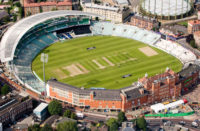Describing Eden Park as just a New Zealand stadium does not do it justice; it is much more than just a sports stadium. Eden Park is a multi-purpose stadium that has a capacity of just under 50 000, thus making it the most famous sports stadium in the country. Located in Auckland, Eden Park hosts various sports, most notably, of course, cricket and rugby. This article will provide readers with an insight into this iconic stadium and focuses on everything about Eden Park, from the early years to the rise of rugby and, finally, the stadium’s standing in the modern era.
The Early Years of Eden Park
Eden Park’s journey began in 1903 through the vision of Harry Ryan. Ryan was a cricket enthusiast and the man who had a dream to turn the barren swamp field in Auckland into a cricket field. To make the dream a reality, Harry Ryan managed to lease a part of the swamp field from owner John Walters and develop a cricket field. The initial development process included clearing the stone walls that divided the farmland. Unfortunately, there were immediate challenges with the potential cricket field, and during the flooding season of 1907, the ground was submerged in water. Add in the high and recurring maintenance costs, it was no longer feasible for any cricket to occur just yet. Still, thanks to the Auckland Cricket Association, who took over the running of the ground, Eden Park was on its way to becoming a cricket stadium.
Eden Park has created notable memorable memories for cricket lovers, filled with many high moments and one dark, heart-aching failure. Eden Park made its international test cricket debut in 1929-1930 when it hosted the test match between New Zealand and England. New Zealand’s first test win on the ground occurred in 1955-1956. With all those highs, there was also a bitter pill to swallow later that year when New Zealand got bowled out for their lowest-ever test score of a measly 26 all out against England.
The Rise of Rugby at Eden Park
By the early 20th century, rugby fever had taken over New Zealand, and in 1913, Eden Park was leased to the Auckland Rugby Football Union. Through this agreement, Eden Park became a dual sporting stadium that hosted both cricket and rugby matches. The following year, Eden Park hosted it’s first-ever rugby match, a seven-a-side series. The venue’s first international rugby test match occurred in 1921 when New Zealand faced South Africa. By 1930, the British Lions made their inaugural tour into New Zealand, and Eden Park hosted two matches, both won by Auckland and New Zealand against the visitors. Another major rugby match played at Eden Park was the 1956 4th test match between New Zealand and South Africa. Today, rugby is widely considered the dominant sport at Eden Park, and the dominance of the All Blacks in Auckland further emphasises this.
The Transformation of Eden Park
The transformation of Eden Park from a simple sports ground into one of the best multi-purpose stadiums globally is remarkable. Throughout the early 1900s to 2000s, Eden Park saw its capacity grow tenfold from modest seating of just a few thousand to grandstands holding up to 50 000 people. With the addition of temporary seating for major international rugby matches, the capacity is projected to increase to 60 000. Some of the most significant renovations at the stadium included installing grandstands, installing floodlights and redeveloping a ‘Motz’ rugby turf.
Some major sporting events hosted at Eden Park throughout its redevelopment included Gymnastics and the British Empire Games. Eden Park was also the scene of two of the most incredible All Blacks rugby feats when the stadium hosted the 1987 and 2011 Rugby World Cup Finals, with host nation New Zealand beating France on both occasions. Before the 2011 World Cup, the estimation of redevelopment costs at Eden Park was an astonishing NZ$410 million/$256 million.
Eden Park in the Modern Era
Today, Eden Park is still the most prominent sports stadium in New Zealand and is also considered the best multi-purpose stadium in the country by far. Besides being a stadium that hosts various sports, Eden Park also has other unique features for people to experience and enjoy. People can attend concerts at Eden Park, with the first-ever concert at the stadium, the Six60 concert, a massive success. More recently, Ed Sheeran performed at the iconic venue just last weekend to much fanfare. Other events at Eden Park include business galas, banquets, non-match day events and tours.
By being a multi-purpose stadium, Eden Park has to boast the latest technological features to cater to the needs of sports fans and event-goers. Sports fans are assured of an enjoyable experience, and a giant LED scoreboard on one of the grandstands allows fans to watch replays of tries, boundaries, and wickets. Event-goers have access to wireless internet connectivity at the stadium, plus a seamless ticket activation procedure when entering the stadium. Other features at the stadium include an excellent dining experience with five-star cuisine options.
Eden Park and Future Prospects
Competition, rivalry and challenges are characteristics of the modern era, and Eden Park is not immune to these. The NZ$986 million/$615 million Christchurch Stadium development is seen as competition for Eden Park Stadium. The need to balance commercial interests is also a sticky point for Eden Park. This is evident with the announcement last week of the All Blacks being unable to host the Springboks at Eden Park due to the stadium already being booked to host matches from the 2023 FIFA Women’s World Cup.
As a major sporting venue, Eden Park has a range of corporate hospitality packages and premium seating options for its guests. While these packages typically include food and beverage options, there is an opportunity to explore the inclusion of online casino games or betting as part of the hospitality experience. While this would require careful consideration and potential regulatory hurdles, it is not unprecedented for sporting venues to offer betting or gaming experiences to their guests. In a world where online gambling is increasingly popular and accessible, it is worth considering whether there is an opportunity for Eden Park to incorporate online casino offerings for NZ players into its existing hospitality packages.
Conclusion
The journey of Eden Park from barren farmland to a majestic multi-purpose stadium is a phenomenal tale. Even though Eden Park has developed further to accommodate concerts and other events, sports, namely cricket and rugby, will always be at the heart of this iconic stadium. Looking back at Eden Park and New Zealand’s sporting history and achievements, you will find a correlation between beautiful memories from Rugby World Cup successes to the Kiwi’s memorable test cricket wins. Through careful cost and expense planning, we believe Eden Park Stadium will continue being a powerhouse in New Zealand for decades.













